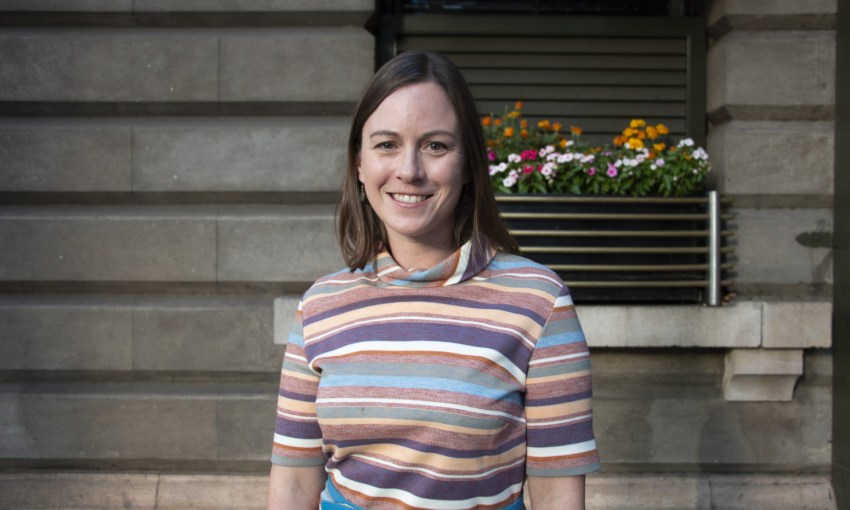She Speaks curator Anne Cawrse says the event, which is jam-packed with live orchestral performances, is a commitment to celebrating classical music’s unheard and unfamiliar works.
A classical music festival celebrating music not composed by ‘dead white men’
University of Adelaide music lecturer and award-winning orchestral composer Anne Cawrse defines the characters of classical music’s gilded canon as “The Dead White Men.”
She Speaks
Saturday, 19 June
Elder Hall
University of Adelaide, North Terrace, Adelaide 5000
Tickets and more info
Anne is curating a four-part mini-festival with the Adelaide Symphony Orchestra, called She Speaks, which will celebrate female composers who have been kept out of the upper echelon of classical music.
“I think there’s a real sweet spot in history at the moment for recognising that women write music as well as men – and they always have,” Anne says.
“But they haven’t always had the opportunities to have that music performed, or to be taken as seriously as the men have.
“Good music is written by people of both genders and from all places as well, [which is] why South Australia is represented there and why women are represented.”
She Speaks is happening on Saturday, 19 June, and consists of four events spread from the University of Adelaide’s Elder Hall to Madley Studio.
The event will kick off with a three-song lunchtime chamber concert, Domestic Voices, at 1pm, which features the first performance in more than 80 years of a work written by the Elder Conservatorium’s first female student to major in composition, Ruby Davy.
The other two pieces come from Clara Schumann and Fanny Mendelssohn Hensel, two female composers who were overshadowed by their husbands or male siblings.
Anne says 19th-century German pianist and composer Clara Schumann was married to Robert Schumann, “a very famous composer very entrenched in the canon of classical music”.
“Fans might be aware that his wife Clara wrote some music as well, but it’s not regularly performed in a way that her husband was,” she says.
Fanny Mendelssohn Hensel has a similar story; also a 19th-century German composer and pianist, she was outshone by her famous brother, Felix Mendelssohn.
— Anne Cawrse
“He was travelling around Europe conducting and composing operas and symphonies and all the fancy things that composers were supposed to do, and Fanny was at home with her family, looking after her husband and raising her son,” Anne says.
Although these women were given the opportunity to write music “as a nice hobby,” Anne says their work wasn’t taken as seriously.
“It’s only in more recent years that we as a society, or as a classical music culture, have gone, ‘Hold on a second’,” she says.
“If we are going to talk about music of the past, we’re going to talk about Robert Schumann and play his music, then why the hell don’t we also consider what his wife wrote? Because some of that’s actually really very good as well.”
She Speaks is not solely about celebrating composers of long-gone generations.
The Evening Orchestral Concert, starting at 7pm, will offer audiences a taste of the contemporary national orchestral music scene.
Anne says audiences will get to hear a “joyous and uplifting” piece from Dulcie Holland called ‘Festival Flourish’, as well as Elena Kats-Chernin’s “brooding and mysterious” ‘Mythic’, Holly Harrison’s “rhythmic riot” ‘Jammed’, among other pieces.
“Dulcie Holland’s work is ‘We’re here to party’ in an orchestral concert sort of way, with Holly Harrison’s piece sounding like the orchestra having a literal jam,” Anne says.
The last of the evening’s performances kicks off at 9pm with the Late Evening Concert, featuring work by Lisa Cheney, Kaija Saariaho, Caroline Shaw and more, performed by a group of musicians including Hilary Kleinig, formerly of Adelaide’s Zephyr Quartet string ensemble.
There are seven works in total, all of which are written by Australian composers, five of whom are living artists.
In addition to the harmonies of She Speaks, the event will also host a symposium, titled Silent Women, which will see many of the musicians from the festival speaking about female voices from the classical canon and what role they play.
Among the list of things discussed will be the positive steps currently being made to address the genre’s gender imbalance.
Anne says there is still “definitely not equity” in the amount of airtime given to female classical musicians, but this is not necessarily her intended aim for She Speaks.
“There’s still not as many women and historically there were far more men,” she says.
Instead, she hopes to promote the idea of giving good music the chance to live, regardless of who produced it.
“I would expect that everyone should learn something,” Anne says.
“So be it through the experience of listening to all the music, or reading the program notes, discovering the composer’s name that they haven’t heard before.
“I think there’s a lot to be learned about, historically, how and why women have written music, and also what they are currently doing and just how worthy of celebration that is.”
See the full She Speaks program and purchase tickets here.




